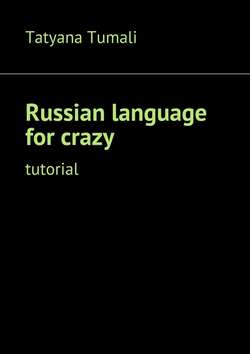Читать книгу Russian language for crazy. Tutorial - Tatyana Yakovlevna Tumali - Страница 15
Model – Где..? =Where…? (case 6)
ОглавлениеRemember! (exceptions to the rule)
Россия – в России, гости – в гостях, берег – на берегу, аэропорт – в аэропорту, дома, Япония – в Японии, церковь – в церкви, общежитие – в общежитии, компания – в компании, столовая – в столовой.
When Russian asks you a question using the model “Где..?”, and you answer using a noun, you should change a ending of a noun to – Е (it’s case 6) and use the prepositions В or НА. What preposition should be chosen? To make memorizing easier nouns are grouped into 2 groups, depending on the preposition that they are used with.
Just learn-).
For example:
– Где вы работаете? (Where do you work?) – Я работаю в университетЕ. (университет – an university). (I work at the university.)
– Где она работает? (Where does she work?) – Она работает на вокзале. (вокзал – a station). (She works at the station.)
Exercise 11.
А) Insert В or НА:
…берегу, …западе,… Москве, …коридоре, … больнице, …гостинице, … России, …работе, …почте, …рынке, …кино, …музее, …аэропорту, … институте, … юге, … школе, … магазине, … гостях, … вокзале, … туалете, …Японии, … Америке, …церкви, … дома, … ресторане, … общежитии, … Интернете, … компании, ….. Европе….кафе
Memorize: говорить (to speak) + по-русски (Russian), по-английски (English), по-испански (Spanish), по-французски (French), по-китайски (Chinese), по-японски (Japanese), по-немецки (German)
Б) Answer the questions, using in reply the pronoun “Я” and the words in brackets. Note the tense in which verbs are used. (The forming of the Present Tense see in exercise 9. Don’t forget to add —Л or – ЛА, when using the Past Tense).
1.Где вы живёте (Москва)?
2.Где вы жили (Америка)?
3.Где вы учитесь сейчас? (университет)
4.Где вы учились раньше? (школа)
5.Где вы работаете? (компания “Газпром”)
6.Где вы говорите по-русски? (институт)
7.Где вы говорите по-английски? (дома)
8.Где вы покупаете продукты? (магазин)
9.Где вы завтракали сегодня? (кафе)
10.Где вы обедали вчера? (ресторан)
11.Где вы ужинали вчера? (дома)
12.Где вы обычно завтракаете? (столовая)
13.Где вы обычно обедаете? (кафе)
14.Где вы обычно ужинаете? (дома)
15.Где вы отдыхаете? (Таиланд)
В) In what sentences the verbs of the Present Tense is used?
Г) In what sentences the verbs of the Past Tense is used?
Exercise 12.
А) Give a negative answer. Sample: Вы говорите по-русски? (Do you speak Russian?) Я не говорю по-русски. (I don’t speak Russian.) Вы курили сегодня? (Have you smoked today?) Я не курил сегодня. (I haven’t smoked today.)
1.Где вы обедали сегодня?
2.Где вы ужинали вчера?
3.Вы говорите по-китайски?
4.Вы говорите по-японски?
5.Где вы завтракали сегодня?
6.Вы говорите по-испански?
7.Вы учитесь или работаете сейчас?
8.Вы говорите по-немецки?
9.Вы говорите по-английски?
10.Вы учились сегодня?
11.Вы говорите по-русски?
Б) In what sentences the verbs of the Past Tense is used?
In Russian language verbs determine an ending of a noun. You can easily choose a noun’s case, when you are asked a question such as “Где..?” you should choose the ending – Е (case 6) without hesitation. But you will not always be answering only. You will speak-)!
Remember, after what verbs should be used a noun in case 6.
So you want to construct a phrase with one of these verbs. How will it look like? First you define what Tense does an event refer to (Past, Present, Future). For example, you want to say where you had breakfast this morning. The action took place in the past, then you use the verb “завтракать” in the Past Tense. If you are a man, add the suffix – Л: Я завтракал. If you are a woman, add —ЛА: Я завтракала. Then change noun’s ending according to case 6 and use the preposition В or НА. For example, let’s take the noun “гостиница”. Change the ending, add preposition В and it turns out В ГОСТИНИЦЕ. So, we’ve constructed the phrase “Я завтракал сегодня в гостинице”. Another example. If you are having breakfast, and someone phones you at this time and asks what you are doing now, you should answer: “Я завтракаю в гостинице”. In this sentence The Present Tense is used.
Let’s take the verb “отдыхать” for example. After this verb should be used a noun in case 6, noun’s ending changes to —Е. Я + отдыхал (the Past Tense) + a noun in case 6. The phrase Я отдыхал Европа is not correct.
If you have a rest in Europe every year, you should say “Каждый год я отдыхаю в Европе”. (“I have a rest in Europe every year”. )
Or: Я + учился + в Америке, а сейчас учусь (the Present Tense) + в Москве.
Or: Я обычно завтракаю + в кафе, обедаю + в ресторане, а ужинаю + дома. (All verbs are used in the Present Tense). The word “дома” doesn’t change as it is an exception.
Sure, you can use these verbs without nouns, for example: Сегодня я отдыхаю. Я сейчас обедаю. Я не работал вчера.
